BANGKOK (2022)
![]()

Foreword by Alger Ji-Liang:
“I’ve been friends with James for six years and he has always been someone who expresses openly without apology. When James asked me to photograph him as Bangkok, I knew we would make magic. Working on the BANGKOK shoot is an extension of who he already is. To me, this work represents his personally realized growth that has been cultivated with love alongside his friends, peers, and community. We didn’t realize it until after, but when we sequenced the images together, we noticed how the contrast of dark and light reflects the space of duality and contrast—a state James is in a lot of the time. He is ambitious, creative, and eager to explore his multitude of selves, while being true to himself. Using photography, (drag) performance, and fashion styling, we created a world where James is reborn as BANGKOK. A renaissance birth where they can exist in their fully-fledged glory”
“I’ve been friends with James for six years and he has always been someone who expresses openly without apology. When James asked me to photograph him as Bangkok, I knew we would make magic. Working on the BANGKOK shoot is an extension of who he already is. To me, this work represents his personally realized growth that has been cultivated with love alongside his friends, peers, and community. We didn’t realize it until after, but when we sequenced the images together, we noticed how the contrast of dark and light reflects the space of duality and contrast—a state James is in a lot of the time. He is ambitious, creative, and eager to explore his multitude of selves, while being true to himself. Using photography, (drag) performance, and fashion styling, we created a world where James is reborn as BANGKOK. A renaissance birth where they can exist in their fully-fledged glory”
About BANGKOK
BANGKOK is a photography project between that explores James’ drag identity
Team:
James Albers - artistic director, writer, performer, model
Ashley Jim - artistic director, fashion stylist
Alger Ji-Liang - photographer, producer
Jenn Xu - photography assistant, second photographer
Alicia Sun - assistant stylist
ap0cene - styling support
Anson Xu - videographer, production assistant
Designers:
JIIJ (@jiijofficial)
Leak NYC (@leak_nyc)
Alexis Shan (@s.hhann)
Bold Studio (@bold_studio_prg)
Kaitlyn Popoff (@the.devils.semen)
BANGKOK is a photography project between that explores James’ drag identity
Team:
James Albers - artistic director, writer, performer, model
Ashley Jim - artistic director, fashion stylist
Alger Ji-Liang - photographer, producer
Jenn Xu - photography assistant, second photographer
Alicia Sun - assistant stylist
ap0cene - styling support
Anson Xu - videographer, production assistant
Designers:
JIIJ (@jiijofficial)
Leak NYC (@leak_nyc)
Alexis Shan (@s.hhann)
Bold Studio (@bold_studio_prg)
Kaitlyn Popoff (@the.devils.semen)
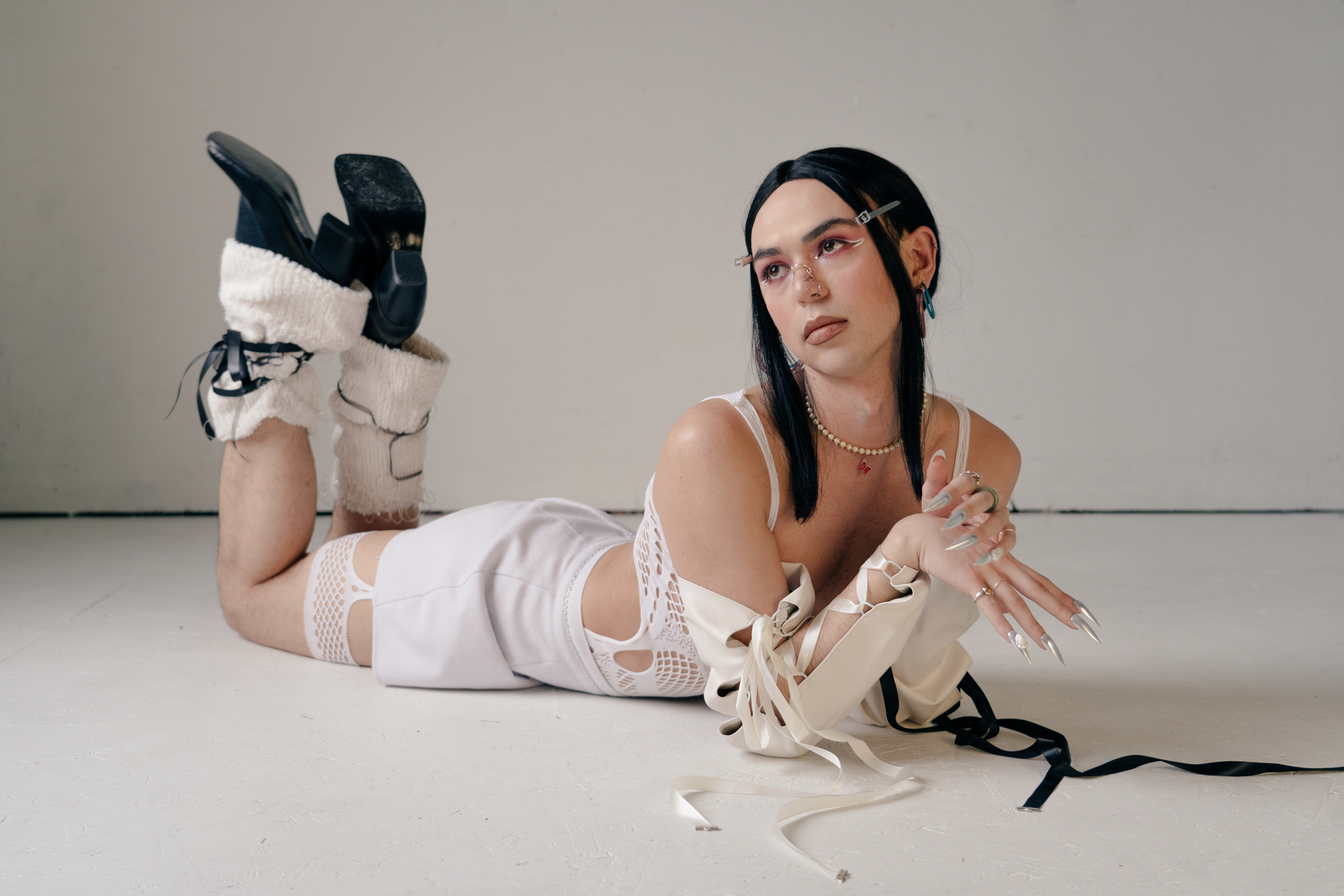


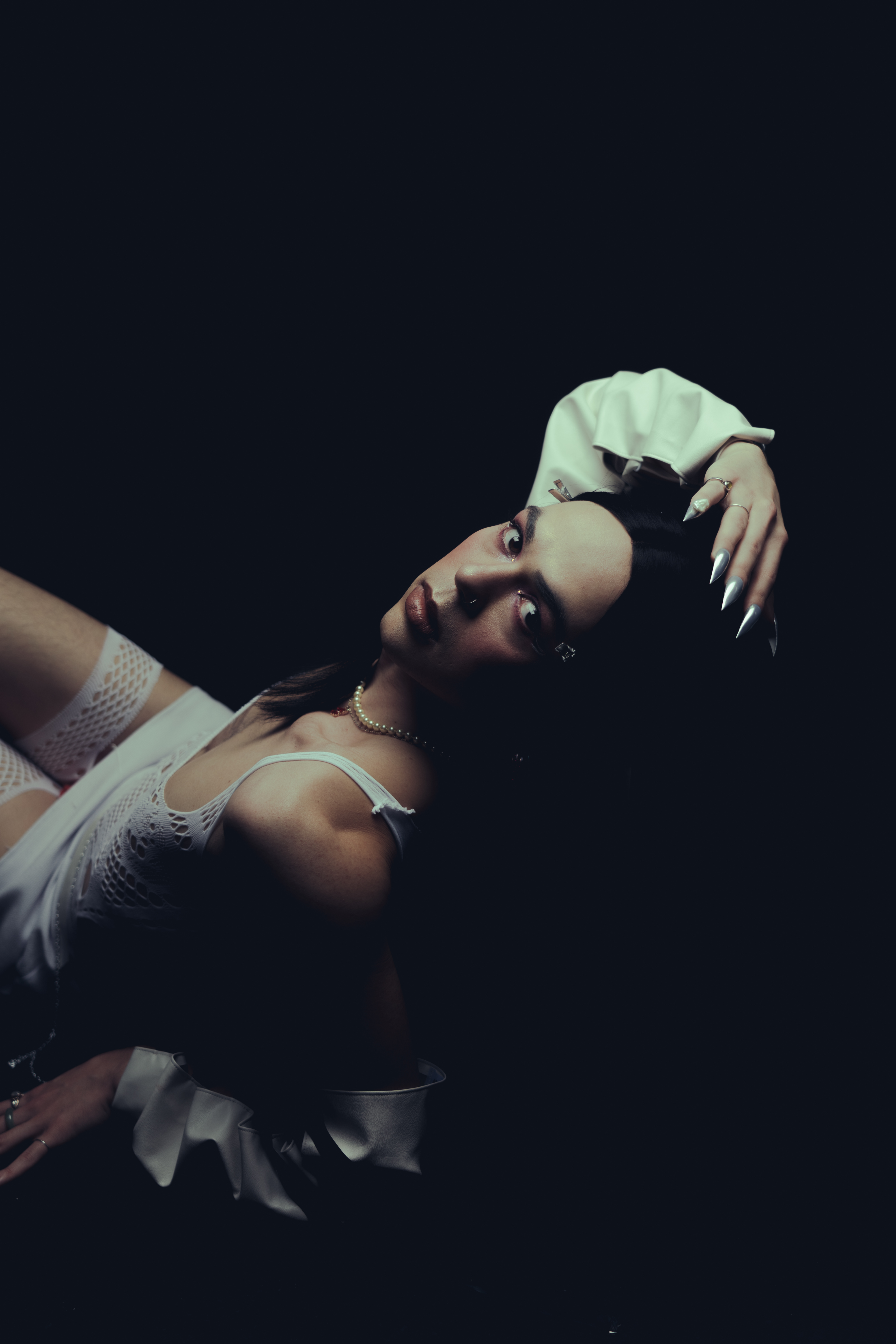
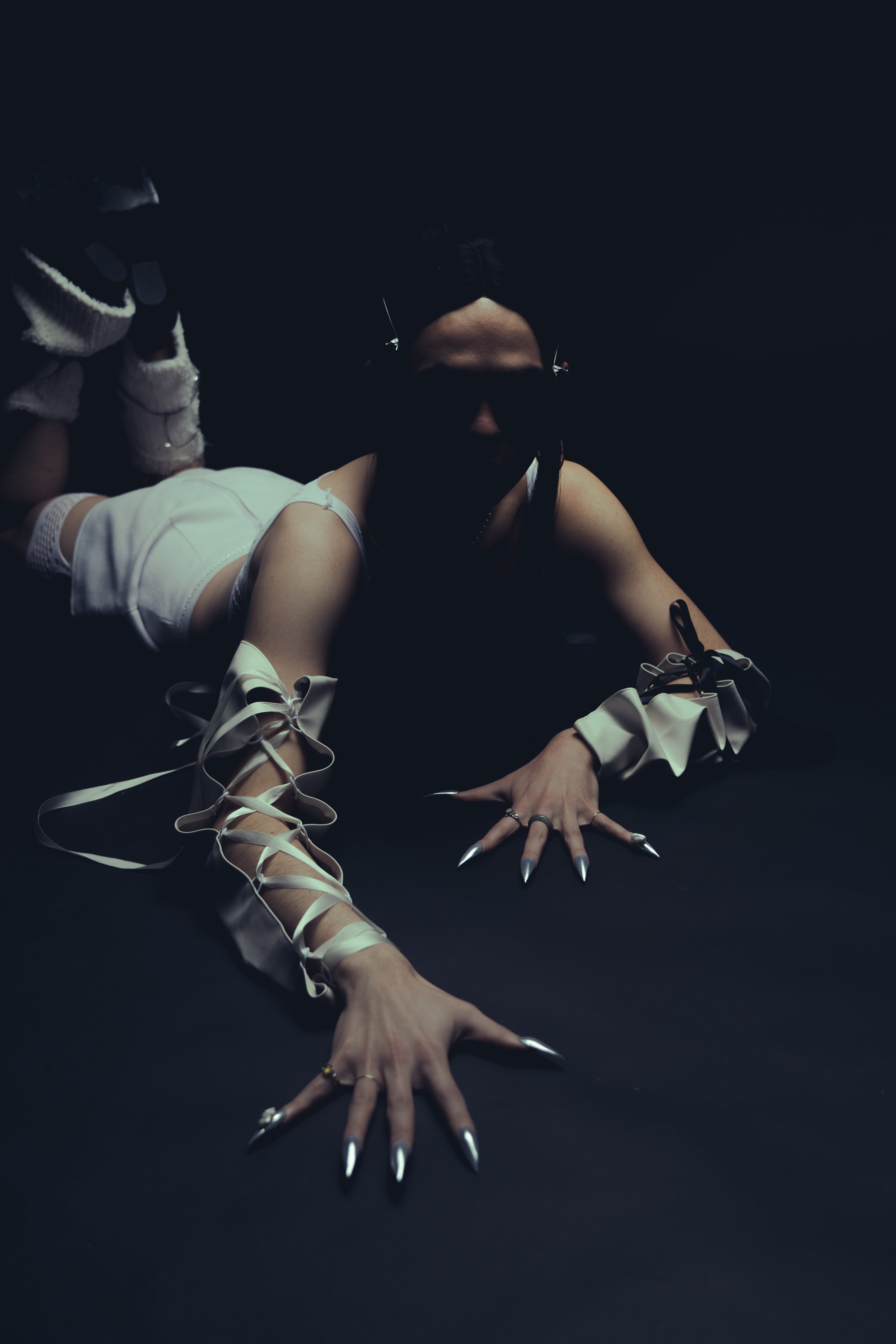
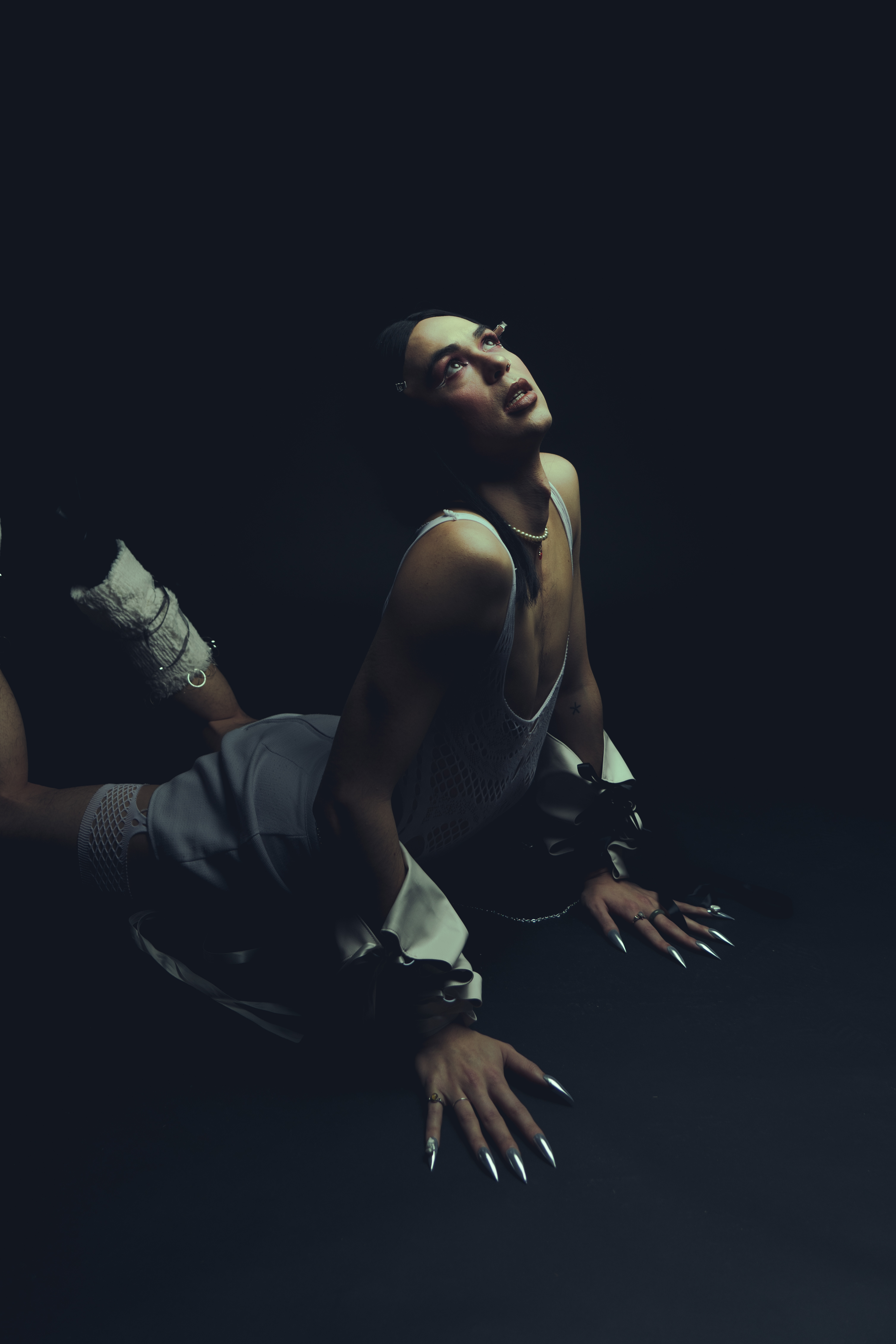
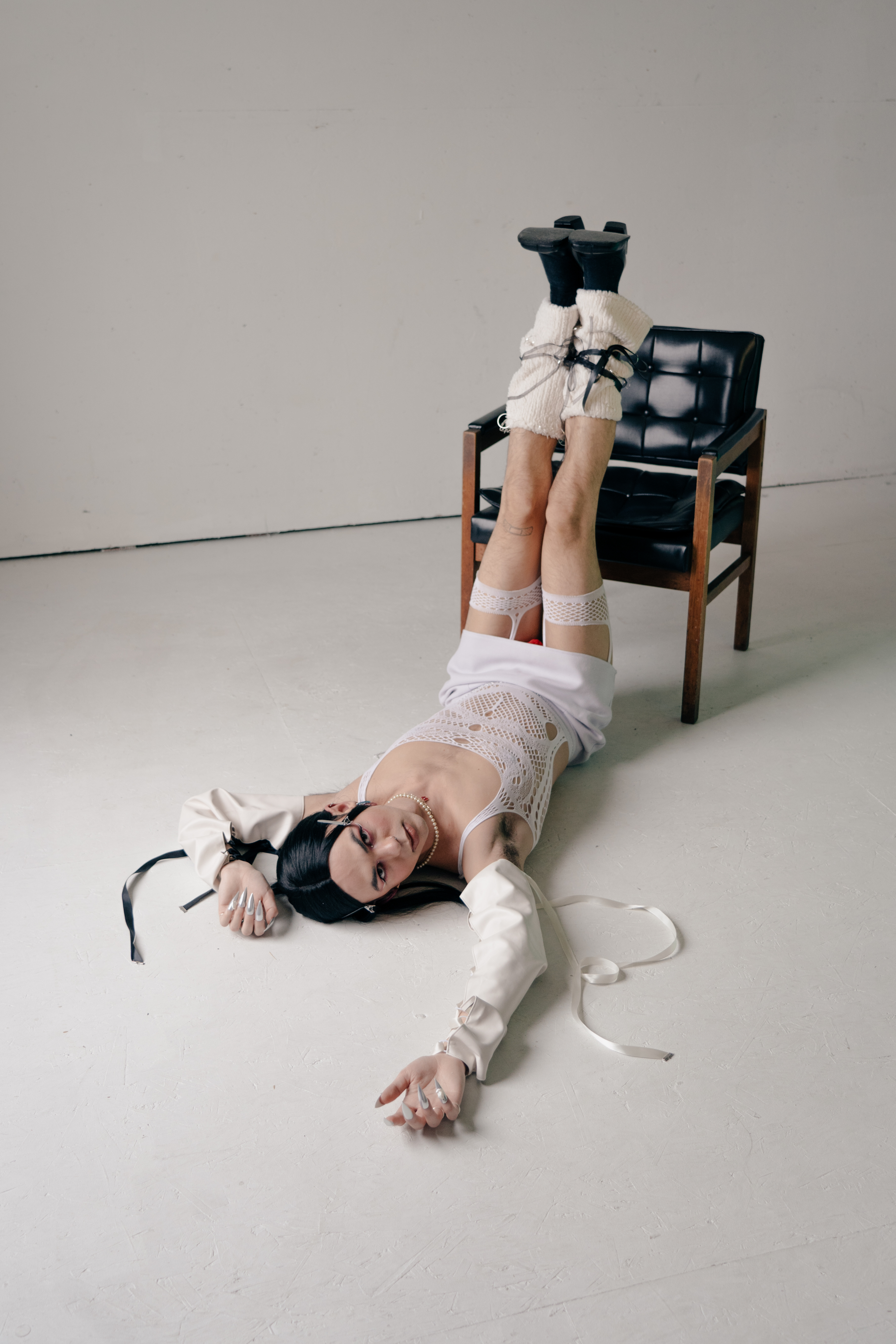


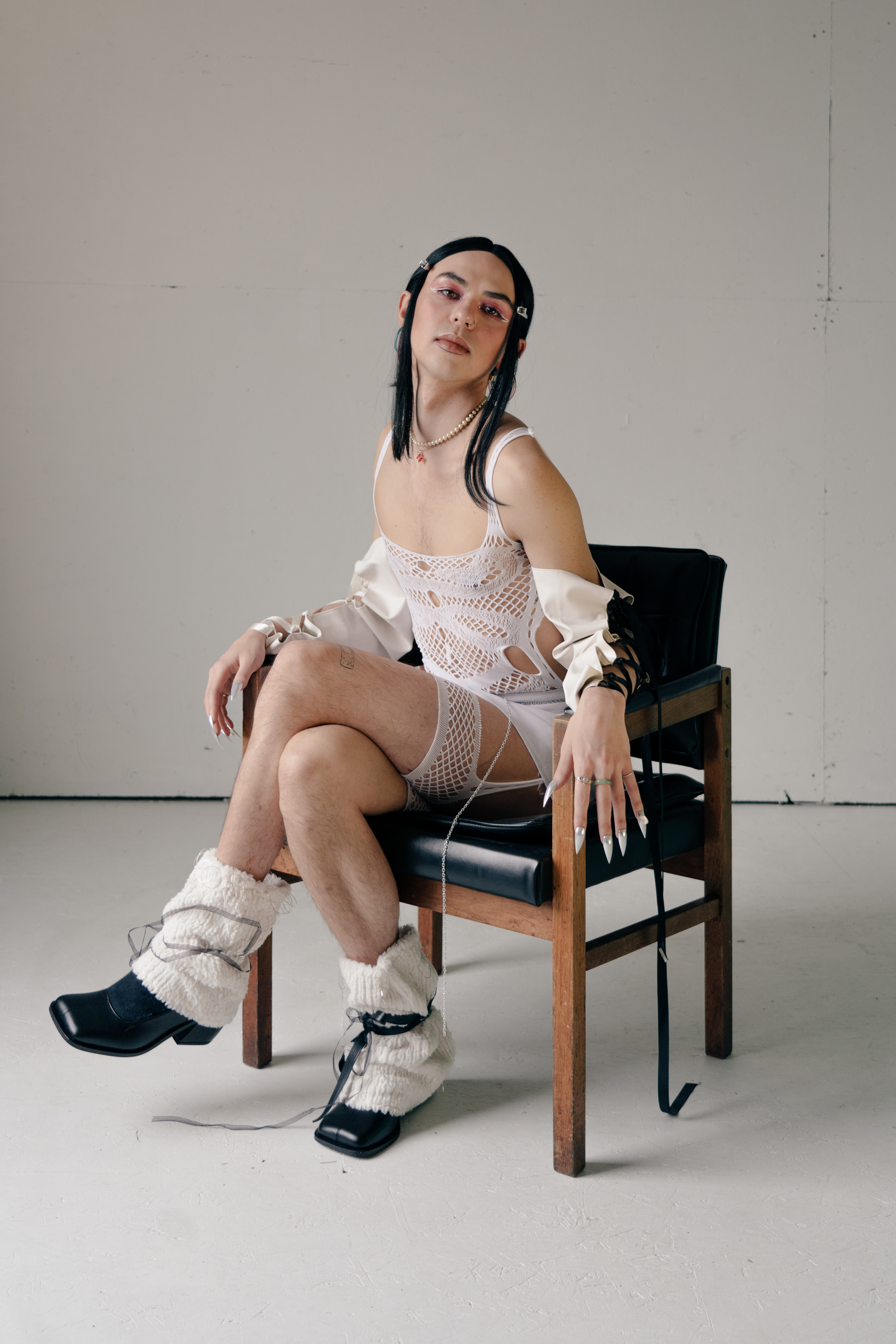
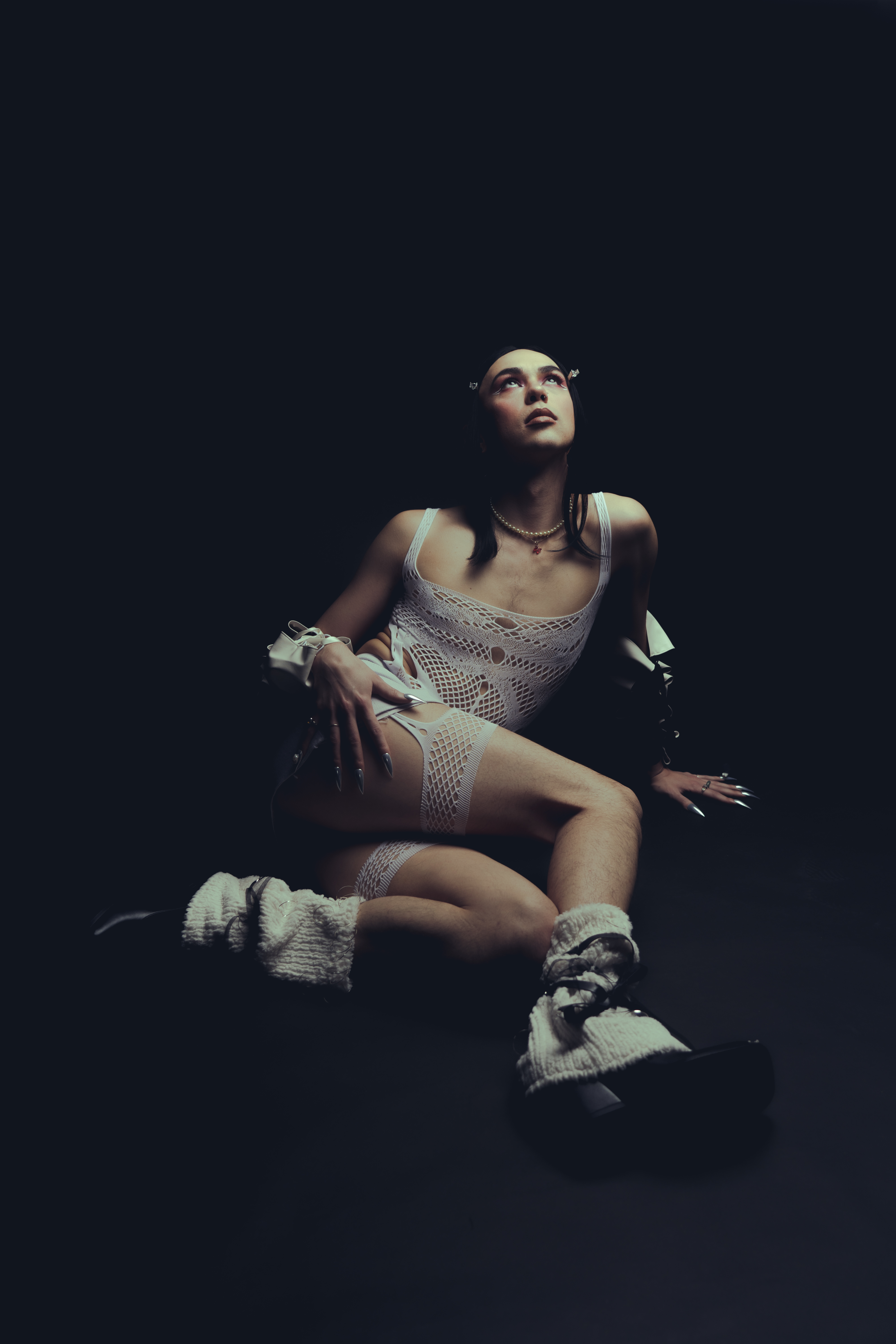
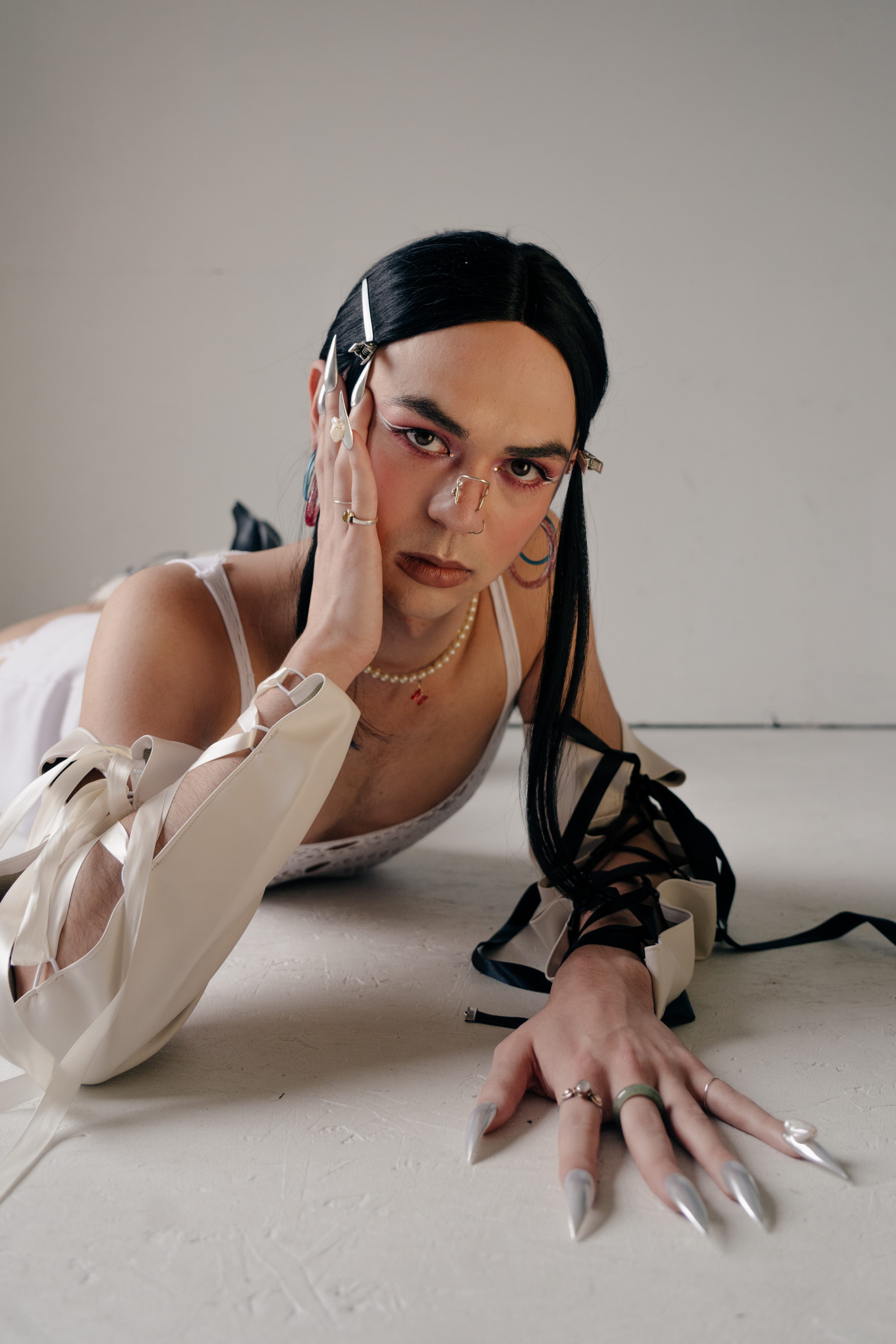
Artistic Director, Model, and Writing: James Albers (BANGKOK)
Dear reader,
Beginning my journey as a drag artist seems to have been written in the stars before I even knew it. Once I decided to make my debut and have serious conversations with friends about it, they all responded with different ways of saying, “Well, it's about time!” or, “I was waiting for you to say that,” and even, “We always knew you would.” Thinking back about it now, the last time I really felt this way was when I was just 14, when I first came out as bisexual—because don’t all queer people at least try to hold onto any assemblage of heteronormativity until they realize that it won’t serve them? The first person I uttered these words to was my older sister. I remember after finally having admitted my romantic/sexual attraction to the same sex as me, I couldn’t talk to her for a week.
“You’re making me feel weird about it,” I told her, breaking the extended silence.
“I’m not doing anything, YOU’RE the one who is making this weird!” And of course, she was right. My fears didn’t come from her—they were all within me. And I had to sit with that. “Nothing has changed, James, I’ve always known.” When I told her I was starting drag, she always knew I would. It was—always—about time.
By now I’ve completed my undergrad with a double major in Visual Art and Art History, lived on my own for 6 years in a new city, have had multiple cycles of friends, lovers, jobs, apartments. As I look back at the works I made in school, I realized that drag was always there. In my first ever performance artwork, I undressed in front of my classmates, put on a skirt, tied my hair back, and scrubbed the floors with soapy water. I didn’t think of that as drag at the time, but this was definitely the beginning of a journey I had no idea would take me to where I am now.
I think we all realized a lot about ourselves during the time we spent away from each other, our communities, most of our loved ones, banging pots and pans at 7pm daily during the early days of the pandemic in the spring and summer of 2020. I think we all realized how important virtuality was during this time, becoming the only way we could maintain relationships, finish classes, entertain, forget, dream, etc. Political and social unrest was at an alltime high. The largest, most widespread, and socially impactful movement began to shed light on the power that institutions held in society. Whiteness, particularly, was finally being put on trial. And all of this occurred online. Instagram stories and Twitter threads became primary sources. TikToks were tiktoking. I was falling in and out of love simultaneously, and this was the context in which Bangkok was first named.
I was on a trip in an almost mystical land tucked within the heart of the Okanagan called Hillbilly Hills with my best friend. I told her that I wanted to start doing drag, and the conversation of a name for my drag persona began. I always knew that I wanted my drag to reference my Thai lineage and my queerness in the context of Asianness, but also to allow for the complexity and contradiction that comes with being mixed raced.
The first name I considered was Ladyboi, having personal connection to this term as it is used in Thailand. I remember the term being used as a weapon against me by my family and cousins—my mother especially. Having always been an effeminate child, my family would tease me and bully me for this by heckling the term ‘ladyboy’ at me.
In Thailand, this term is used in a variety of ways and has multiple understandings. Firstly, it’s the term used to describe trans women, mostly by foreigners and tourists who come to Thailand in pursuit of exploring its bustling sex tourism industry. This relationship that the term has to both queerness and Orientalist fetishism drew me to the title. ‘Ladyboy’ is also used to describe gay men who are more feminine presenting in general.
Lots of people have said that they see Thailand as one of the most open Asian countries in terms of its acceptance towards queer and gender deviant people. But when this word was used by my family towards me, it didn’t feel accepting. Queerness in Thailand is mostly valued from the outside, known internationally for being a hot spot for trans prostitution and often represented in popular culture as such. Thailand is called “the Land of Smiles'' because the people are seen as happy, hospitable, joyful, cheerful, and gleeful. But to me, this smile is subservient. It is a smile that one wears as a facade, because happiness is profitable. People from Western countries don’t have the happiness that they covet, so they seek it elsewhere. The Thai woman wears a smile so that the white man may value her. Thailand smiles, but it reveals crooked teeth.
When I was called ‘ladyboy,’ my cousins were smiling, grinning, and laughing uncontrollably. But there was no smile on my face—instead, tears and humiliation. The desire that I had to adopt this name came from the queer desire to reclaim this story for myself. Finally declaring that—yes, I am a ladyboy, and I am smiling :)
However, the name ‘Ladyboy’ is quite popular in the world of drag, and I couldn’t find an Instagram handle involving the name without defiling it with random dots and underscores. “How about Bangkok?” I proposed to my bestie. We liked it. It was simple, witty, ironically honest, and references my Thai heritage. We talked about different ways to spell it, considering the suggestive “Bang-cock,” but ultimately deciding against it for it felt a little too pointed. Spelling the name that way felt like I was boxing it in to the overtly sexual representation of Thai culture, not to mention that there was already a queen somewhere else with that spelling. Plus, the name of Thailand's capital and largest city already does the work for me. Bangkok had been named.
Now, I consider Bangkok to be my surname, and Ladyboi as a sort of title. As I explore more facets of Bangkok, I realize that even the name is subjective and fluid. I’ve already birthed two alter egos of my alter ego, BangCaucAsian (the white side of them) and BOYKOK (the masculine side of them).
After my first few performances, I realized that performing in front of people wasn’t exactly the thing I needed to do to make her feel like she was real. My first ever performance was virtual, which was fitting for Bangkok given her fascination with the digital realm, and it was staged in my room. Something about being able to see her on a screen made it feel more real—a product of living in our newly hyper virtualized world. Being Bangkok is not the same as seeing Bangkok, and I needed to see Bangkok on the screen of my Macbook or within the endless scroll of my Instagram feed or TikTok ‘For You Page’ to feel like she was actually present. I needed the validation of the stranger online, the likes, the comments, the shares, the views, the yasses, the slays.
The final step of Bangkok’s emergence into this world as a real entity was her first ever photoshoot. I wanted this photoshoot to be a declaration. I wanted Bangkok to burst through the frame of the image saying, “I have finally arrived, and it’s about Time,” as stated by all those who supported me along the way. I wanted to be able to see her in a way that others could see her, as her own entity. But the other important fact of her birth was that it works outwards—if I am bursting into this world loud and confident, then I am bringing all those who brought me here with me. I don’t want to leave anyone behind.
As this was my first time doing a photoshoot of myself, I wanted a team of first timers as well. The obvious choice for the photographer was my dear friend Alger Ji-Liang, whom I’ve known since moving to ‘Vancouver’ six years ago. This was also his first time shooting something so large scale, a conceptual shoot with multiple collaborators. In terms of styling, I remember talking to my friend Ashley Jim about our dreams and aspirations while laying on my bed. She had expressed to me that she wanted to pursue styling at the same time that I told her I wanted to start drag. It was only natural that she would be the first ever stylist that I worked with, as I was her first official client. Dreams beget more dreams.
The shoot was also planned for the same day that I would make my large stage debut at East Side Studios, a warehouse that houses the majority of Vancouver’s queer club scene. As this performance also felt like a declaration, I chose to perform ‘Born Yesterday’ by one of my favourite artists, Arca. This shoot was conceptually centred around this performance. I remember Ashley asking for some keywords and inspirations for the styling of this shoot, and I gave her a series of binaries that seemingly contradict each other—soft/metal, sensual/violent, light/dark, vulnerable/alien, sensitive/bitchy. I wanted to express all of these ideas and how they may synchronize with each other in one visual reality—a fantasy that was undoubtedly Bangkok’s own.
I think my attraction to paradox, contradiction, and binaries can be attributed to my mixed raciality. One photo, in particular, makes me think of this. Bangkok lays on the floor leaning forward towards the camera, one arm resting on the ground for stability and the other presses against her face. Her finger pulls her eyelid towards her temple, referencing the childish microaggression against Asians by mocking their eye shape. This gesture is full of contradiction as well as reclamation. Within her gaze, she asks, ‘How do I perform my own Asianness from the middle ground of a mixed race perspective?’ Her lived experiences are defined by this difficult middle space—not Asian enough, not white enough. Bangkok is the embodiment of this contradiction.
“Born Yesterday” by Arca was the perfect song to burst into this world with. This song is also both a declaration and a reclamation. The lyrics speak of taking one's power and confidence back after heartbreak, ideas that I am all too familiar with. To me, the song is about empowerment through vulnerability. It's about admitting that the mistakes you’ve made have made you who you are and also that pain has made you grow, even if it has held you so down at some point. This song for me is about holding space for that contradiction, that I can love my pain and think it's beautiful and transformative but also still somehow… painful. Pain is transformative if you let it be.
In this womb-like darkness, Bangkok looks up at the light as though it is her own god—a sort of life-giving shimmer that reveals her to the world. This light shines upon her queer divinity and illuminates her upward gaze.
In a 2020 interview with Pitchfork regarding her album KiCk i, Arca spoke of what the title means to her. It references the prenatal kick within the mother’s womb that marks a child's manifestation of its own distinct individuality: “When a child is brought into the world, kicking is the first manifestation of its will. So I see it as a metaphor for individuation, for choosing to differentiate yourself. It’s a rallying cry to kick against categorization. If it’s oppressive, kick against it. And I liked that it was physical” (Arca, 2020). These photos are my own kicks: a declaration that I am ever present and that my individual journey may birth many queer realities, utopias, and worlds that my guarded, scared, and crying childhood self would never have imagined was possible. Only in her dreams did she ever kick for what she deserved.
- Bangkok
APA citation for Arca:
Sherburne, P. (2020, May 20). Live From Quarantine, It’s the Arca Show. Pitchfork Magazine. https://pitchfork.com/features/interview/live-from-quarantine-its-the-arca-show/.